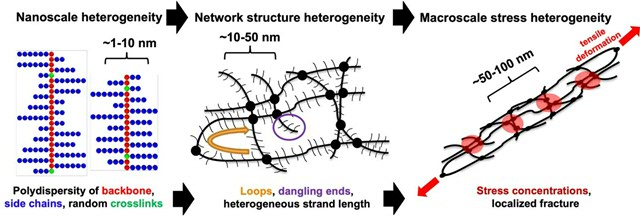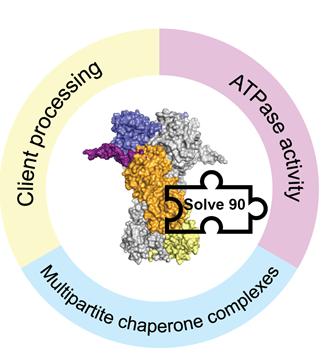Two Open Competition Science-M grants for FSE researchers
Dr Andrea Giuntoli of the Zernike Institute for Advanced Materials and Dr Kasia Tych of the Groningen Biomolecular Sciences and Biotechnology Institute (GBB) have received an Open Competition Science M grant from the Dutch Research Council (Nederlandse Organisatie voor Wetenschappelijk Onderzoek, NWO). Giuntoli receives an M1 grant worth EUR 350,000 for his project ‘Better ultra‐soft elastomers through defects control’. Dr Kasia Tych and Dr Sonja Schmid from Wageningen University & Research (WUR) (coordinator) will together receive an M2 grant worth EUR 700,000. The title of their project is ‘Understanding the master chaperone of our cells’.
M grants are intended for innovative, high-quality fundamental research and / or studies with scientific urgency.
Better ultra‐soft elastomers through defects control | Dr Andrea Giuntoli (Zernike Institute for Advanced Materials)
Defects in materials are not only unavoidable, they can also be used smartly to improve mechanical properties. This idea inspired this project for a new class of ultra-soft rubbers consisting of a cross-linked network of bottlebrush polymers. These materials contain imperfections on various length scales, but it is unknown how this diversity affects the final material properties. With defect engineering as the ultimate goal, various large-scale computer simulations are used in this project which, supplemented with machine learning algorithms, will provide insight into the role of multiscale defects on the mechanical properties of bottlebrush polymer networks.

Understanding the master chaperone of our cells | Dr Katarzyna Tych (GBB) and Dr Sonja Schmid (WUR)

Proteins constitute the molecular machines in our cells. However, many of them would be non-functional without the help of the cell’s master chaperone, Hsp90, which turns them into functional entities. Surprisingly, despite this central role, we still don’t understand how this Hsp90 actually works. Schmid and Tych will therefore use new technology to elucidate the relevant small scale of individual molecules. They will test how Hsp90 is energetically powered, how it treats the other proteins, and how it coordinates its necessary helper proteins. The research will provide a currently missing molecular-level understanding of Hsp90 and thus inform the development of cancer therapeutics.
NWO Open Competition Domain Science-M
M-grants are intended for realizing curiosity-driven, fundamental research of high quality and / or scientific urgency. The grant offers researchers the possibility to elaborate creative and risky ideas and to realise scientific innovations that can form the basis for the research themes of the future.
| Last modified: | 10 July 2023 5.52 p.m. |
More news
-
13 May 2024
‘The colourful cells of petals never get boring!’
Most people will enjoy colours in nature. However, the interest of evolutionary biologist Casper van der Kooi goes much further: he studies how flowers, birds, butterflies, and beetles get their colours. He also studies how these colours are used...
-
13 May 2024
Trapping molecules
In his laboratory, physicist Steven Hoekstra is building an experimental set-up made of two parts: one that produces barium fluoride molecules, and a second part that traps the molecules and brings them to an almost complete standstill so they can...
-
07 May 2024
Lecture with soon to be Honorary Doctor Gerrit Hiemstra on May 24
In celebration of his honorary doctorate, FSE has invited Hiemstra to give a lecture entitled ‘Science, let's talk about it’ on the morning of 24 May
